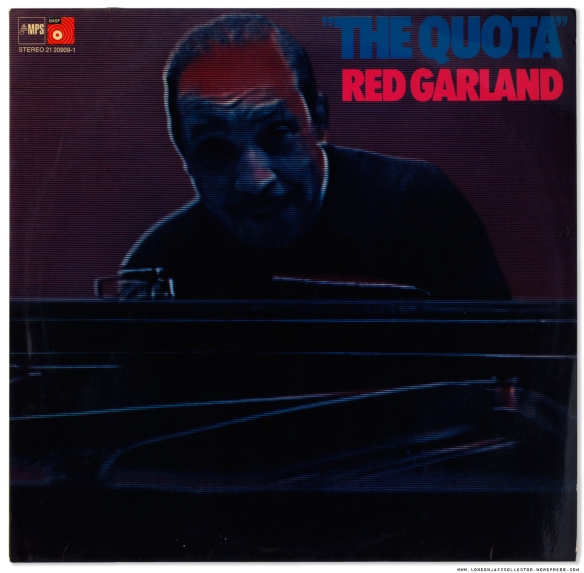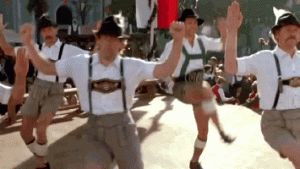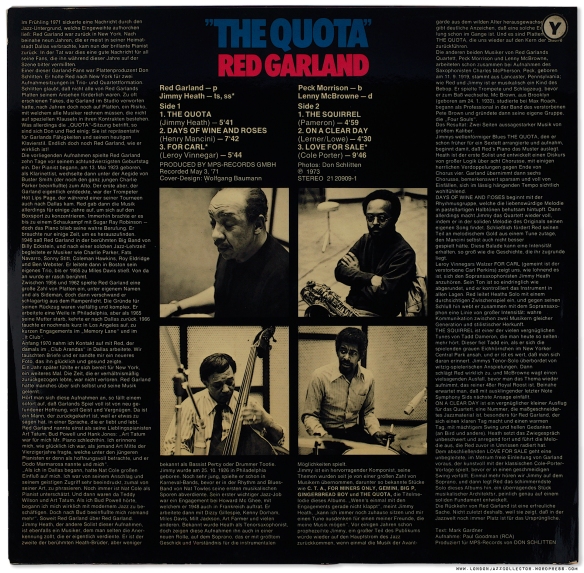A break from trophy Blue Notes, something more modest, and a curio. Time to polish up your German.

Selection: The Quota (J Heath)
Artists
Jimmy Heath (tenor, soprano sax) Red Garland (piano) Peck Morrison (bass) Lenny McBrowne (drums) recorded at RCA Studios, NYC, May 3, 1971, produced by Don Schlitten for MPS/BASF.
Garland here at age 48, a decade-long absence, his last previous recording was in 1962. He returned to the studio in 1971 to record two albums for the German MPS/BASF label, “The Quota”, and Auf Wiedersehen, produced by entrepreneurial Cobblestone/ Muse/ Xanadu producer Don Schlitten.
label, “The Quota”, and Auf Wiedersehen, produced by entrepreneurial Cobblestone/ Muse/ Xanadu producer Don Schlitten.
Schlitten seems to have briefly gone total lederhosen, recording these icons from the Bop era in the US, but for a German chemical company owned label, MPS. More Black Forest gateau anyone? Schlitten is the German word for sled or sledge. So, Don Sledge. Germanic roots? Why is the title “The Quota” between inverted commas? Is it a thinly-concealed pun on “quotation marks”, like a quote? And why so many questions?
Artist of note: William McKinley Garland, Jr. – “Red Garland”
At the age of nineteen, would be boxer William “Red” Garland went eight rounds with Sugar Ray Robinson. Garland lost so badly (he modestly claimed he did hit Robinson “once or twice“), the young fighter from Dallas gave up his dream of becoming a welterweight champion and returned to his other passion: playing the piano. A win win for us. A decade later Garland’s interest in boxing gave him something in common with a young trumpet player, looking for a pianist: Miles Davis. Davis reportedly asked Philly Joe to find him someone like Ahmad Jamal. Instead Jones found him Garland.
Garland joined Miles Davis’s first quintet, and was the driving rhythmic force on many Davis Prestige recordings, including the “missin’ G” series: (Cookin’ , Relaxin’ , Workin’ and Steamin’ following which Miles fired him on account of his errant attendance record. It was Red swinging away behind the piano on the marvellous 1957 Art Pepper Meets The Rhythm Section for Contemporary. (If you had asked me, I would have guessed Wynton Kelly, wrongly, but then guessing was never my strong suit, or pianistic nuance)
Garland then formed his own trio, changing membership over time, but significantly became Coltrane’s principal pianist, through to the time Coltrane jumped ship to Impulse, Jimmy Heath briefly replacing Coltrane in the quintet, if my memory serves me well (LJC Fact-checker is on extended sick leave, cut me some slack)
After recording prodigiously for Prestige up until in 1962, he effectively “vanished”. His reappearance here on two albums for Schlitten/ MPS in the early 70’s marked a nearly ten year absence. Those of you old enough to remember, ten years is a helluva long time. “The Quota”, and a more Germanic-sounding Auf Weidersein,  which means, more or less ” Until we meet again, cheers, I’m off”. And true to his word, he was off.
which means, more or less ” Until we meet again, cheers, I’m off”. And true to his word, he was off.
A handful of recordings later in the ’70s marked a belated comeback, and his last date was in 1983, at age 60, when the final curtain fell on an glittering early career that seemingly evaporated. Fickle public taste is of course of little concern to those of us with analog vinyl time-machines, Red sounding fresh as today. No, fresher!
Music
Garland’s grip is intense, no diminution with time, if anything he has more attack. His music is forceful and determinedly mainstream, All the bop alumni here have deep immersion in the music. Lenny McBrowne is a familiar name from some early Riverside recordings, Jimmy Heath a regular, as is Peck Morrison. Schlitten is the hidden hand, the Svengali assembling the line up from talented musicians perhaps treading water against the shifting tide of popular taste.
For the technically minded, Garland has a distinctive block chord voicing:
constructed of three notes in the right hand and four in the left hand, with the right hand one octave above the left. Garland’s left hand played four-note chords that simultaneously beat out the same exact rhythm as the right-hand melody played. (Wiki)
Knowing how it’s done doesn’t help me appreciate what he does, which I do simply by listening. He has a crystalline attack, serving up thick chords and blistering runs, rhythmic precision, a mastery of his own voice and direction. He sounds better to me here, without the frontline “distraction” of Miles Davis and John Coltrane. (Yes, I’ll go wash my mouth out)
The other player that interested me in parting with some cash was Jimmy Heath, a great tenor player and he more than gives of his best here, muscular, charging fast and fiery, sort of an American Tubby Hayes , if I’m allowed to say that.
Vinyl: MPS/BASF (G) 21 20909-1
There doesn’t seem to have been a US vinyl release of The Quota, and the liner notes are entirely in German, so tell us it was not intended for international distribution. Why Germany and not one of Schlitten’s native US labels? Being recorded in 1971, the session is just on the outer margins of the golden era of modern jazz, and predates digital incursion. Sounds great to me.
Collector’s Corner
I had never seen this album before. It turned up by chance among a stash of Japanese pressings sold to a record store by a music journalist who received them all in the ’70s in his capacity as a music magazine reviewer at the time. Most were previously virtually un-played, yet inexplicably, very dusty. I can only guess the reviewer, being a hip dude, would take records out of their sleeve and leave them casually lying around, but was entirely unfamiliar with the workings of a domestic vacuum cleaner.
I thought an English language set of liner notes might provide more background as to what brought Garland back to the studio after a decade’s absence, and why a German release. Snooping around Discogs I thought I had cracked it with a reissue on Crystal Jazz – sounded promising, but no.
The label Crystal was a jazz reissue label dating from the 80s, specialising in records originally issued by SABA and MPS. Full circle, German liner notes.
I found a Japanese CD with a brief description
長い隠遁生から一時的に復帰を果たした姿を捉えた、人気ピアニストの貴重なドキュメント。おなじみのガーランド節の魅力が満載のトリオ・アルバム。1971年5月 ニューヨークにて録音。
And an Italian Wikipedia entry for the second recording:
Auf Wiedersehen è un album di Red Garland, pubblicato dalla MPS Records nel 1975. Il disco fu registrato nel maggio del 1971 al RCA Studios di New York.
(I think I knew this already, Wiki editors, go the extra mile…)
Any German-speakers out there, the liner notes are in the usual high-definition full screen readable picture, might want to enlighten the rest of us if there is anything of interest. Failing that, thanks for being here, great music continues…surprises for all. More Blue Note soon.




Just discovered this record. Based on the date, label (German jazz label?!) cover (easily one of the worst album covers ever), my expectations were low. It’s definitely worth having if you like Red. His playing didn’t evolve much, but that’s not necessarily a bad thing.
LikeLike
I’m a big fan of Red Garland whether it’s cool or not. I don’t have this one but I have many. I have these on my list but never saw covers before so that’s cool. His version of Blue Velvet slays me. So much good music. People who dismiss him as a cocktail pianist or old fashion haven’t really listened. That’s ok, it happens. That’s how I rolled when I was young.
LikeLike
MPS’ predecessor, SABA, licensed a number of Prestige titles for German distribution so it’s possible that’s where the Schlitten connection was established. Nathan Davis and Pony Poindexter cuts, among others, were licensed back to the US via Prestige in the late ’60s. It’s too bad that some of the SABA/MPS stars like Hans Koller and Wolfgang Dauner didn’t get more exposure over here.
LikeLike
Very nice — I enjoyed that track. I like MPS. The label released some good music. I’ve got a couple of delicious Martial Solal LPs on the label (Four Keys and Nothing But Piano). I think it also released Cecil Taylor, Willem Breuker, Albert Mangelsdorf and other free jazz luminaries. An interesting label. And affordable!
LikeLike
My copy is USA 1974 – no note – no gatefold – just good listening.
LikeLike
This one’s a new LP to me but that’s quite a line-up with Garland and Heath together plus former Lou Donaldson bass-player Morrison. I think there’s a rich vein of early 1970s recordings of ex-pat US artists open to relatively inexpensive exploration for us. For example, I’ve recently been really enjoying Cedar Walton’s Eastern Rebellion, which features George Coleman, Sam Jones and Billy Higgins.
Back to this record though: I suspect it’s been unfashionable for a long time to like Garland but I’ve got to say that I’ve always appreciated his playing. He’s swinging, unpretentious and has a lovely touch with a ballad. I do suspect, however, that once you’ve heard a certain number of Garland trio LPs, you’ve heard them all.
Jimmy Heath is a true great and still playing. I’d love the opportunity to see him live but I fear the chances of a UK appearance are slim. As already mentioned, his Riverside LPs are well worth checking out and seem to go under the radar of the trophy hunters so prices aren’t exploitative (yet!).
LikeLike
I love Red Garland. I think he rewards repeated listening, and I also prefer him in a trio setting. He swung very hard, and could sure play the blues. A genuine motherfucker, as the phrase goes.
LikeLike
I will admit that I was not the biggest fan of Red G. But I like him here. And I will also admit that I am a fan of the hard left and hard right panning of the drums and horn…particularly compared to modern recordings that are mostly dead center mono (nicht so gut, meine freund), with little stereo information. This LP sounds hard to come by, but I’ll be on the lookout. Danke Schoen!
LikeLike
“Knowing how it’s done doesn’t help me appreciate what he does, which I do simply by listening. ”
That’s where you and I differ, LJC. Without some ability to understand how the sound is really being created, I often have a lot of trouble appreciating it. That’s why I dislike so much electronic music. I don’t understand its creation. But with jazz, especially, I can really appreciate what I am hearing being a mostly live performance of skill via manipulation of a mechanical object to create sound waves. Wonderful!
LikeLike
I think I already told the story of a wedding party recently where I found myself seated next to a trumpet player. Just to make polite conversation I asked how he could get so much variety of tone and pitch from an instrument with just three valves. He seized the question with delight – someone was interested! – and then spent at least fifteen minutes explaining it. Me little wiser.
Anyway, less that 24 hours since the post and already we got people arguing. Great!
I hate modern electronic music because… no, that would take much longer to explain.
LikeLike
Its all music.
That’s the beautiful part. 🙂
LikeLike
Modern electronic music is essentially the sound of data entry. Hard to love.
LikeLike
AWWWWWWW……………. 😉
LikeLike
wait, who is arguing? listening is easy to do. there’s no wrong way.
LikeLike
Electronic music can be very commercial, trivial and boring (e.g. the stuff that David Guetta puts out), but the best of house (progressive, etc.) is cutting edge of music today, which jazz is not – I agree with the remarks about Marsalis. There are some excellent composers and it can swing like a you-know-what (trying to stay polite).
I grew up with 78s of Fats Walller, Benny Goodman and others, and have been playing hard bop since the early 60s. I love jazz, but when I ventured into the clubbing world ten years ago, I found some superb music.
Above all, the audience for house consists of people who are out for a good time. In my experience, most jazz fans today are grumpy old farts who just want to argue all the time – not on this website, though. There is a jazz bulletin board where that happens 100% of the time, and I left it for that reason. Music is supposed to be for enjoyment, and I have enjoyed many a night out at house venues.
We can enjoy current music without having to stop listening to jazz. I listen to (and play) both.
LikeLike
Commendably mature outlook, well said. People get something from all different kinds of music, good for them. There are some very different online communities where posters seem to spend a lot of their time belittling each other. Jazz lovers I have encountered over the years all seem to be very open-minded and kind people, generous with their time and their thoughts. This is a good place to be.
LikeLike
For what it’s worth… I have it as MPS BSAF STEREO MC20909 same cover, promo sticker on front of cover. Back cover has same photos but no liner notes and a date of 1974 o the l.p. Label which is identical to the one you pictured. All printing on record and label is in English.
LikeLike
I have the same version and cover. I think it is an original US 1st pressing.
A wounderful rendition of Mancini´s “Days of wine and roses”. And “The Squirrell ” correctly attributed to T. Dameron
LikeLike
One more thing from the liner notes which I found interesting. Jimmy Heath prophesying that Jazz is coming back to its nucleus. That was 1971 when a lot of avantgarde and free was going on. And many of the real people were frustated by that. Good to know that Jimmy was right.
And note one typo that never had been corrected. Tadd Dameron’s “The Squirrel” is credited to a certain Mr. Pameron.
LikeLike
But Jimmy wasn’t right.
It didn’t.
Unless you’re thinking of the of the warmed over re-hash of the so called ‘Neo Traditionalists’ of the 1980’s: Wynton Marsalis & his Repertory Krew.
LikeLike
Hear, hear!
LikeLike
nailed it. fuck wynton marsalis.
LikeLike
Jimmy Heath had already given the title “The Quota” to a brilliant Riverside LP in 1962, a sextet session with Freddie Hubbard, Julius Watkins on the French horn, Cedar Walton on piano, and the other Heath brothers to round out the rhythm section. Well worth looking into, particularly “Bells and Horns” my favorite of the date.
LikeLike
Yes I love my Original Riverside pressing of the 1962 Jimmy Heath “The Quota”. It probably falls just outside of my Top 10 favorite albums!
LikeLike
Mark Gardner (British??) always wrote informative liners. This liner gives a lot of info, most of which generally known. Why “the Quota”? We have got to ask the composer Jimmy Heath. No explanations given, neither why chosen as the album title. Common practice though.
Don Schlitten became aware of Red’s presence in NY, because of the rumors in the New York “underground scene”, No relation to the tube of course.
MPS was a fine label doing many piano sessions in Villingen. I think they gave Don the job to produce the two piano albums for them, in the same vein as their previous ones (Hampton Hawes, O. Peterson, and many more).
LikeLike
+1 on the horsepower rating of Jimmy Heath, LJC. He had a spectacular run on Riverside from ’59 – ’62: ‘The Thumper’, ‘Really Big!’, ‘The Quota’ & ‘Triple Threat’. He recorded ‘The Thumper’ @ 33: sophisticated writing, arranging & band leading poise. No wonder Miles liked him.
LikeLike
The German liner notes are mainly about the musicians and the songs. Main information on Garland is the following:
The recording was made in New York 10 days before his 48th birthday. Being born May 13th 1923 this must be May 3rd 1971. The writer Mark Gardner then tells us, that the reasons for Garlands absence on the the scene are “diverse and complex”. He had been working in Philly for a while but returned to Dalles when his mother died in 1965. In 1966 he had some short engagements in L.A. in clubs called “Memory Lane” and “It Club”.
In early 1970 the writer contacted Garland and they exchanged some letters (letters – good old times). Garland sent a foto showing him happy and healthy. A year later he was ready to go to New York for another time (obviously invited by Don Schlitten). “But the time he had been living in retirement wasn’t lost. Red Garland had learned a couple of things about himself and his music.”
That’s about it.
Cheers
Clemens
LikeLike
Let me say thanks.
LikeLike
Apparently in the Japanese version it says Red Garland came out of retirement for a documentary series on great piano players and that the album was recorded in New York May 1971.
LikeLike